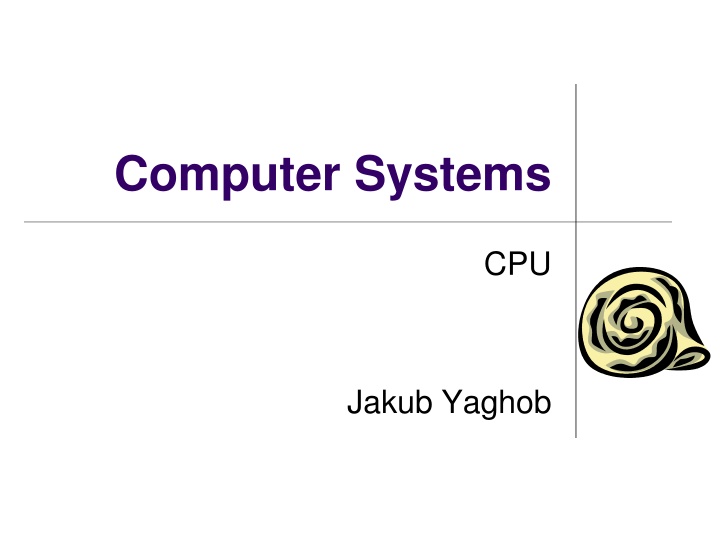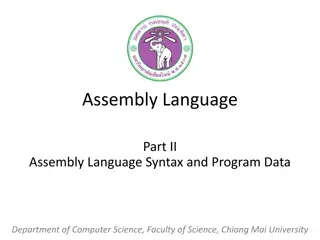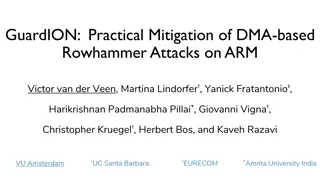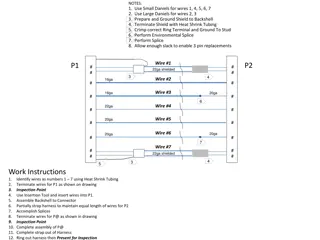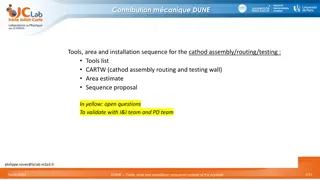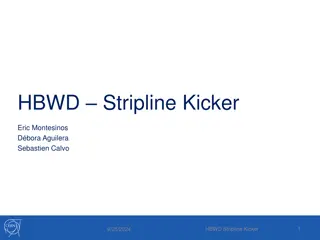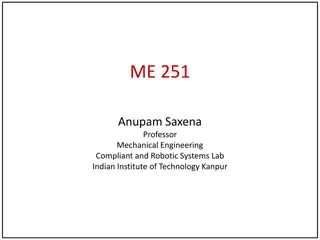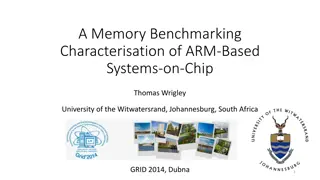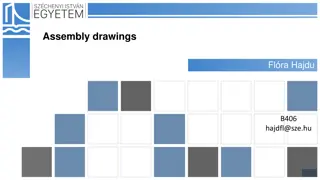ARM-7 Assembly Functions
This content explores the significance of functions in ARM-7 assembly language programming, emphasizing modularity, code design, ease of writing, reading, and debugging, as well as reusability. It delves into the concept of making functions, highlighting the benefits and steps involved in defining and calling functions in assembly language.
Download Presentation

Please find below an Image/Link to download the presentation.
The content on the website is provided AS IS for your information and personal use only. It may not be sold, licensed, or shared on other websites without obtaining consent from the author.If you encounter any issues during the download, it is possible that the publisher has removed the file from their server.
You are allowed to download the files provided on this website for personal or commercial use, subject to the condition that they are used lawfully. All files are the property of their respective owners.
The content on the website is provided AS IS for your information and personal use only. It may not be sold, licensed, or shared on other websites without obtaining consent from the author.
E N D
Presentation Transcript
Computer Systems CPU Jakub Yaghob
Von Neumann architecture Simple, slower CPU Memory I/O
Harvard architecture Microcontrollers Multiple address spaces Instruction Memory Data Memory CPU I/O
Real PC architecture External Graphics Card Sandy Bridge PCI express 16 2133-1066 MHz DDRIII Channel 1 Cache Core Core System Agent Mem BUS Memory controller GFX DDRIII Channel 2 Display link 4 DMI Line out D-sub, HDMI, DVI, Display port Line in S/PDIF out Audio Codec South Bridge (PCH) exp slots S/PDIF in BIOS PCI express 1 LPC Super I/O Lan Adap Parallel Port SATA USB SATA Serial Port PS/2 keybrd/ mouse Floppy Drive DVD Drive Hard Disk mouse LAN
CPU Architecture HW ISA "Simple" machine Executes instructions Instruction simple command
Instructions - motivation How can we execute the following code? if(a<3) b = 4; else c = a << 2; for(int i=0;i<5;++i) a[i] = i; int f(int p) { return p+1; } void g() { auto r = f(42); }
Instruction classes Load instructions Store instructions Move instruction Arithmetic and logic instructions Jumps Unconditional x conditional Direct x indirect x relative Call, return
Registers Types General, integer, floating point, address, branch, flags, predicate, application, system, vector, Naming Direct x stack Aliasing
Registers example 32-bit x86 EAX EBX ECX EDX ESI EDI EBP ESP AX BX CX DX AH BH CH DH AL BL CL DL CS DS ES SS FS GS SI DI BP SP EFLAGS FLAGS IP EIP
MIPS simple assembler Execution environment 32-bit registers r0-r31 r0 is always 0, writes are ignored r31 is a link register for the jal instruction No stack No flags PC register
MIPS register aliases Register $r0 $r1 $r2-$r3 $r4-$r7 $r8-$r15 $r16-$r23 $r24-$r25 $r26-$r27 $r28 $r29 $r30 $r31 Name $zero $at $v0-$v1 $a0-$a3 $t0-$t7 $s0-$s7 $t8-$t9 $k0-$k1 $gp $sp $fp $ra Purpose 0 Assembler temporary Return value Function arguments Temporaries Saved temporaries Temporaries Kernel registers DO NOT USE Global pointer Stack pointer Frame pointer Return address Preserve N/A No No No No Yes No N/A Yes Yes Yes Yes
MIPS instructions Arithmetic add $rd,$rs,$rt R[rd] = R[rs]+R[rt] addi $rd,$rs,imm16 R[rd] = R[rs]+signext(imm16) sub $rd,$rs,$rt subi $rd,$rs,imm16
ISA comparison MIPS ADD $t1,$t1,$t0 ADDI $t1,$t1,1 x86 ADD eax,ebx ADD eax,1 ADD $t2,$t0,$t1 MOV eax,ebx ADD eax,ecx
MIPS instructions Logic operations and/or/xor/nor $rd,$rs,$rt andi/ori/xori $rd,$rs,imm16 R[rd] = R[rs] and/or/xor zeroext(imm16) No not instruction, use nor $rd,$rs,$rs Shifts sll/slr $rd,$rs,shamt R[rd] = R[rs] << / >> shamt sra $rd,$rs,shamt
ISA comparison MIPS NOR $t1,$t2 x86 MOV eax,ebx NOT eax SLL $t1,$t1,3 SHL eax,3
MIPS instructions Memory access lw $rd,imm16($rs) R[rd] = M[R[rs] + signext32(imm16)] sw $rt,imm16($rs) M[R[rs] + signext32(imm16)] = R[rt] lb $rd,imm16($rs) R[rd] = signext32(M[R[rs] + signext32(imm16)]) lbu $rd,imm16($rs) R[rd] = zeroext32(M[R[rs] + signext32(imm16)]) sb $rt,imm16($rs) M[R[rs] + signext32(imm16)] = R[rt] Moves li $rd,imm32 R[rd] = imm32 move $rd,$rs R[rd] = R[rs]
ISA comparison MIPS LW $t1,1234($t0) SW $t1,1234($t0) LB $t1,1234($t0) LI $t1,5678 MOVE $t1,$t0 x86 MOV eax,[ebx+1234] MOV [ebx+1234],eax MOV al,[ebx+1234] MOV eax,5678 MOV eax,ebx
MIPS instructions Jumps j addr PC = addr jr $rs PC = R[rs] jal addr R[31] = PC+4; PC = addr
ISA comparison MIPS J label JR $ra x86 JMP label1 JMP [ebx] JAL fnc CALL fnc
MIPS instructions Conditional jumps beq $rs,$rt,addr If R[rs]=R[rt] then PC=addr else PC=PC+4 bne $rs,$rt,addr Testing slt $rd,$rs,$rt If R[rs]<R[rt] then R[rd] = 1 else R[rd] = 0 sltu $rd,$rs,$rt Unsigned version slti $rd,$rs,imm16 If R[rs]<signext(imm16) then R[rd] = 1 else R[rd] = 0 sltiu $rd,$rs,imm16 If R[rs]<zeroext(imm16) then R[rd] = 1 else R[rd] = 0
ISA comparison MIPS BEQ $t0,$t1,label x86 CMP eax,ebx JZ label SLT $t2,$t1,$t0 BNE $t2,$zero,label CMP eax,ebx JL label SLTI $t2,$t1,5 BNE $t2,$zero,label CMP eax,5 JL label
Flags Only used by some ISA Control execution Check status of the last instruction Usual flags Z zero flag S sign flag C carry flag
CPU Architecture Memory controller Cache hierarchy Core Registers Types Logical processor Hyper threading Instructions
Instruction Simple command to the CPU Encoding Assembler Operands Instruction flow PC Stack? SP
ISA Instruction set architecture Abstract model of CPU Classification CISC Complex Instruction Set Computer RISC Reduced Instruction Set Computer VLIW Very Long Instruction Word EPIC Explicitly Parallel Instruction Computer Orthogonality Accumulator Load-Execute-Store
CPU simplified scheme T1 T5 T0 T4 T2 T6 T3 T7 EU EU EU EU L1I L1D L1I L1D L1I L1D L1I L1D L2 L2 L2 L2 CORE 1 CORE 0 CORE 2 CORE 3 L3/LLC Package
Real CPU scheme package Intel Coffee Lake
Real CPU scheme core
CPU architecture pipeline Current CPU 14-19 stages
CPU architecture superscalar processor Current CPU 5-way, asymmetric
CPU architecture out-of- order execution Decoder OPs Reservation station (pool) Port 0 Port 1 Port 5 Port 6 Port 2 Port 3 Port 4 Port 7 AGU Load AGU Load AGU Store AGU I ALU I Logic Branch I/V ALU I/V MUL I/V ALU I/V MUL I/V ALU Vec Shuff I/V Logic F ADD I/V Logic Comp Int String Bit scan F FMA F FMA AES SQRT I/F DIV Reorder buffer Branch
